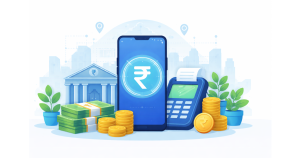India’s e-commerce sector is one of the fastest-growing in the world, driven by a surge in internet users and a burgeoning middle class. Here’s a detailed look at the top 10 e-commerce startups that are revolutionizing the way Indians shop and do business online.
1. Flipkart:

Flipkart started as an online bookstore and quickly expanded to offer a wide range of products, including electronics, fashion, and home goods. Acquired by Walmart in 2018, Flipkart is a dominant player in India’s e-commerce space, known for its Big Billion Days sales and strong logistics network.
Description: Flipkart, founded by Sachin Bansal and Binny Bansal in 2007, started as an online bookstore and quickly diversified to offer a wide range of products including electronics, fashion, and home goods. With its headquarters in Bangalore, Flipkart became a major player in the Indian e-commerce market and was acquired by Walmart in 2018.
Summary: Flipkart is a leading e-commerce platform in India, known for its extensive product range, efficient logistics, and major sales events like Big Billion Days. Acquired by Walmart, it continues to dominate the market with strong customer loyalty and innovative services.
| Feature | Description |
|---|---|
| Founders | Sachin Bansal and Binny Bansal |
| Founded | 2007 |
| Headquarters | Bangalore |
| Initial Focus | Online bookstore |
| Current Focus | Wide range of products including electronics, fashion, and home goods |
| Key Milestones | Acquired by Walmart in 2018 |
| Major Sales Event | Big Billion Days |
| Strengths | Strong logistics network |
| Location | Bangalore |
| Website | Flipkart |
Also Read: top 10//economicedge.in/top-10-social-media-startups-in-india/
2. Myntra:
Initially a personalized gift items platform, Myntra pivoted to become a leading online fashion retailer. Acquired by Flipkart in 2014, Myntra offers a wide array of clothing, footwear, and accessories, partnering with over 1,500 brands. Its End of Reason Sale is one of the biggest fashion sales in India.

Description: Myntra was founded in 2007 by Mukesh Bansal, Ashutosh Lawania, and Vineet Saxena. Initially focusing on personalized gift items, Myntra pivoted to become a leading online fashion retailer. It was acquired by Flipkart in 2014 and operates from Bangalore, offering a wide array of clothing, footwear, and accessories.
Summary: Myntra is a top fashion e-commerce platform in India, recognized for its vast selection of brands and products. Known for its End of Reason Sale, Myntra leverages its parent company Flipkart’s resources to provide a seamless shopping experience.
| Feature | Description |
|---|---|
| Founders | Mukesh Bansal, Ashutosh Lawania, and Vineet Saxena |
| Founded | 2007 |
| Headquarters | Bangalore |
| Initial Focus | Personalized gift items |
| Current Focus | Fashion retail |
| Key Milestones | Acquired by Flipkart in 2014 |
| Major Sales Event | End of Reason Sale |
| Strengths | Partnership with over 1,500 brands |
| Location | Bangalore |
| Website | Myntra |
Also Read: top 10//economicedge.in/top-10-cybersecurity-startups-in-india/
3. Paytm Mall:
An offshoot of the digital payments giant Paytm, Paytm Mall integrates a marketplace and the Paytm Wallet, offering a seamless shopping experience. It focuses on electronics, fashion, and groceries, leveraging Paytm’s extensive user base to drive growth.

Description: Launched in 2016 by Vijay Shekhar Sharma, Paytm Mall is an e-commerce platform integrating a marketplace with the Paytm Wallet. Based in Noida, it offers products in categories such as electronics, fashion, and groceries, leveraging Paytm’s massive user base for growth.
Summary: Paytm Mall combines digital payments with e-commerce, providing a seamless shopping experience. It focuses on various product categories, supported by Paytm’s strong financial ecosystem.
| Feature | Description |
|---|---|
| Founder | Vijay Shekhar Sharma |
| Founded | 2016 |
| Headquarters | Noida |
| Initial Focus | Marketplace integrated with Paytm Wallet |
| Current Focus | Electronics, fashion, and groceries |
| Key Milestones | Integration with Paytm’s extensive user base |
| Major Sales Event | Various seasonal sales |
| Strengths | Seamless shopping experience with digital payments |
| Location | Noida |
| Website | Paytm Mall |
Also Read: top 10//economicedge.in/top-10-beautytech-startups-in-india/
4. Snapdeal:
Snapdeal began as a daily deals platform but transitioned to a full-fledged e-commerce marketplace. Known for its focus on value-driven products, Snapdeal has built a niche in offering affordable goods across various categories, including home, fashion, and electronics.

Description: Snapdeal was founded in 2010 by Kunal Bahl and Rohit Bansal as a daily deals platform but transitioned into a full-fledged e-commerce marketplace. Headquartered in New Delhi, it focuses on offering affordable goods across various categories.
Summary: Snapdeal caters to value-conscious consumers, providing a wide range of affordable products. Its transition from a deals platform to a comprehensive marketplace has solidified its position in the Indian e-commerce sector.
| Feature | Description |
|---|---|
| Founders | Kunal Bahl and Rohit Bansal |
| Founded | 2010 |
| Headquarters | New Delhi |
| Initial Focus | Daily deals platform |
| Current Focus | Affordable goods across various categories |
| Key Milestones | Transition to full-fledged e-commerce marketplace |
| Major Sales Event | Various value-driven sales |
| Strengths | Focus on value-driven products |
| Location | New Delhi |
| Website | Snapdeal |
Also Read: top 10//economicedge.in/top-10-constructiontech-startups-in-india/
5. Nykaa:
Nykaa is India’s leading online beauty and wellness retailer, offering a wide range of products from domestic and international brands. Known for its extensive product reviews and beauty advice content, Nykaa has also launched its private label products, expanding into physical retail stores.

Description: Nykaa, founded by Falguni Nayar in 2012, is a leading online retailer for beauty and wellness products. Based in Mumbai, it offers a vast range of products from both domestic and international brands, along with its private label.
Summary: Nykaa is a premier destination for beauty and wellness products in India. Known for its extensive product reviews and beauty advice, it has expanded into physical retail stores and launched its private label products.
| Feature | Description |
|---|---|
| Founder | Falguni Nayar |
| Founded | 2012 |
| Headquarters | Mumbai |
| Initial Focus | Beauty and wellness products |
| Current Focus | Wide range of beauty and wellness products, including private labels |
| Key Milestones | Launch of private label products, expansion into physical stores |
| Major Sales Event | Nykaa Beauty Sale |
| Strengths | Extensive product reviews and beauty advice content |
| Location | Mumbai |
| Website | Nykaa |
Also Read: top 10//economicedge.in/top-10-adtech-startups-in-india/
6. BigBasket:
BigBasket is the largest online grocery delivery service in India, providing a wide range of products including fresh fruits, vegetables, and household items. Acquired by Tata Group in 2021, BigBasket’s robust supply chain and efficient delivery network have made it a household name in online grocery shopping.

Description: Founded in 2011 by Hari Menon, Vipul Parekh, V.S. Ramesh, V.S. Sudhakar, and Abhinay Choudhari, BigBasket is India’s largest online grocery delivery service. Headquartered in Bangalore, it offers a wide range of grocery products and household items.
Summary: BigBasket is a leading online grocery platform, known for its extensive product range and efficient delivery network. Acquired by Tata Group, it continues to expand its market presence with reliable service.
| Feature | Description |
|---|---|
| Founders | Hari Menon, Vipul Parekh, V.S. Ramesh, V.S. Sudhakar, and Abhinay Choudhari |
| Founded | 2011 |
| Headquarters | Bangalore |
| Initial Focus | Online grocery delivery |
| Current Focus | Wide range of grocery products |
| Key Milestones | Acquired by Tata Group in 2021 |
| Major Sales Event | Monthly grocery sales |
| Strengths | Robust supply chain and efficient delivery network |
| Location | Bangalore |
| Website | BigBasket |
Also Read: top 10//economicedge.in/top-10-hrtech-startups-in-india/
7. Lenskart:
Lenskart revolutionized the eyewear industry in India by offering prescription glasses, sunglasses, and contact lenses online. Its unique home eye check-up service and virtual try-on feature have made it a popular choice among consumers. Lenskart has also expanded into offline stores, enhancing its omnichannel presence.

Description: Lenskart was founded in 2010 by Peyush Bansal to revolutionize the eyewear industry in India. Based in Faridabad, it offers prescription glasses, sunglasses, and contact lenses with innovative services like home eye check-ups and virtual try-ons.
Summary: Lenskart is a prominent eyewear retailer in India, known for its unique services and wide product range. Its omnichannel presence, including online and offline stores, provides customers with a seamless shopping experience.
| Feature | Description |
|---|---|
| Founder | Peyush Bansal |
| Founded | 2010 |
| Headquarters | Faridabad |
| Initial Focus | Eyewear |
| Current Focus | Prescription glasses, sunglasses, and contact lenses |
| Key Milestones | Introduction of home eye check-up service and virtual try-on feature |
| Major Sales Event | Various seasonal sales |
| Strengths | Omnichannel presence with online and offline stores |
| Location | Faridabad |
| Website | Lenskart |
ALso Read: top 10//economicedge.in/top-10-fashiontech-startups-in-india/
8. FirstCry:
FirstCry is the largest online store for baby and kids products in India. It offers a vast range of products, including diapers, clothing, toys, and feeding essentials. With over 400 offline stores, FirstCry has built a strong omnichannel presence, catering to the needs of young parents across the country.

Description: FirstCry, founded in 2010 by Supam Maheshwari and Amitava Saha, is the largest online store for baby and kids products in India. Headquartered in Pune, it offers a vast range of products including diapers, clothing, toys, and feeding essentials.
Summary: FirstCry is a leading e-commerce platform for baby and kids products, known for its wide selection and strong omnichannel presence. With over 400 offline stores, it caters to the needs of young parents across India.
| Feature | Description |
|---|---|
| Founders | Supam Maheshwari and Amitava Saha |
| Founded | 2010 |
| Headquarters | Pune |
| Initial Focus | Baby and kids products |
| Current Focus | Wide range of baby and kids products |
| Key Milestones | Expansion to over 400 offline stores |
| Major Sales Event | FirstCry sales on baby products |
| Strengths | Strong omnichannel presence |
| Location | Pune |
| Website | FirstCry |
Also Read: top 10//economicedge.in/top-10-mobility-startups-in-india/
9. Pepperfry:
Pepperfry is a leading online furniture and home decor marketplace. It offers a wide selection of products ranging from sofas and beds to home accessories and lighting. Known for its robust supply chain and quality products, Pepperfry has also established physical experience centers to enhance customer trust and experience.

Description: Pepperfry, founded in 2012 by Ambareesh Murty and Ashish Shah, is an online marketplace for furniture and home decor. Headquartered in Mumbai, it offers a diverse selection of products and operates physical experience centers.
Summary: Pepperfry is a top online destination for furniture and home decor in India. It is known for its quality products, robust supply chain, and unique physical experience centers where customers can view products before purchasing online.
| Feature | Description |
|---|---|
| Founders | Ambareesh Murty and Ashish Shah |
| Founded | 2012 |
| Headquarters | Mumbai |
| Initial Focus | Furniture and home decor |
| Current Focus | Wide selection of furniture and home decor products |
| Key Milestones | Establishment of physical experience centers |
| Major Sales Event | Various home decor sales |
| Strengths | Quality products and robust supply chain |
| Location | Mumbai |
| Website | Pepperfry |
Also Read: top 10//economicedge.in/top-10-traveltech-startups-in-india/
10. Grofers (now Blinkit):
Grofers, rebranded as Blinkit in 2021, focuses on delivering groceries and essentials within minutes. Its hyperlocal delivery model and efficient logistics have made it a favorite for quick and convenient shopping. The startup’s promise of instant delivery has set new benchmarks in the online grocery segment.

Description: Grofers, founded in 2013 by Albinder Dhindsa and Saurabh Kumar, is a hyperlocal grocery delivery service based in Gurgaon. In 2021, it rebranded as Blinkit, focusing on rapid delivery of groceries and essentials.
Summary: Blinkit (formerly Grofers) is a hyperlocal delivery service specializing in groceries and essentials. Known for its fast delivery model and efficient logistics, Blinkit has become a preferred choice for quick grocery shopping in India.
| Feature | Description |
|---|---|
| Founders | Albinder Dhindsa and Saurabh Kumar |
| Founded | 2013 |
| Headquarters | Gurgaon |
| Initial Focus | Grocery delivery |
| Current Focus | Hyperlocal grocery and essentials delivery |
| Key Milestones | Rebranded as Blinkit in 2021 |
| Major Sales Event | Various grocery sales |
| Strengths | Hyperlocal delivery model and efficient logistics |
| Location | Gurgaon |
| Website | Blinkit |
Also Read: top 10//economicedge.in/top-10-edutech-startups-in-india/
FAQ on E-commerce Startups in India:
1. What are some key challenges faced by e-commerce startups in India?
E-commerce startups in India face challenges such as intense competition from established players, logistical complexities in a geographically vast country, regulatory hurdles, and the need to build trust among consumers for online transactions.
2. How do e-commerce startups differentiate themselves in the crowded market?
E-commerce startups differentiate themselves through unique value propositions such as niche product offerings (like beauty products, groceries), superior customer service, innovative technologies (like virtual try-ons for eyewear), and exclusive partnerships with brands.
3. What role do investments and funding play in the growth of e-commerce startups?
Investments and funding are crucial for e-commerce startups to scale operations, expand their product range, improve technology infrastructure, and conduct marketing campaigns. They also help in attracting top talent and building brand equity.
4. How have consumer behaviors in India influenced e-commerce startup strategies?
Consumer behaviors in India, such as increasing digital adoption, preference for convenience, value-consciousness, and demand for personalized experiences, have influenced e-commerce startups to innovate with faster deliveries, easy payment options, discounts, and loyalty programs.
5. What are some future trends expected in the Indian e-commerce startup ecosystem?
Future trends in Indian e-commerce startups include further integration of AI and machine learning for personalized shopping experiences, growth in mobile commerce, expansion into rural markets, sustainability initiatives, and increased focus on digital payments and cybersecurity.
6. How do e-commerce startups contribute to the Indian economy?
E-commerce startups contribute to the Indian economy by generating employment across various sectors, boosting digital infrastructure development, supporting SMEs and local artisans, enhancing logistics and supply chain efficiencies, and promoting financial inclusion through digital payments.
7. What are some strategies e-commerce startups use to build trust among consumers?
E-commerce startups build trust by ensuring secure payment gateways, offering transparent return and refund policies, showcasing customer reviews and ratings, providing reliable customer support, and partnering with reputable brands or suppliers.
8. How do e-commerce startups leverage data analytics and AI technologies?
E-commerce startups use data analytics to understand consumer behavior, predict trends, optimize inventory management, personalize marketing campaigns, and improve overall operational efficiency. AI technologies are applied for chatbots, recommendation engines, fraud detection, and logistics optimization.
9. How do regulatory policies impact e-commerce startups in India?
Regulatory policies impact e-commerce startups regarding foreign investment restrictions, tax compliance, data privacy regulations (like GDPR and India’s Personal Data Protection Bill), and e-commerce guidelines issued by authorities like the DPIIT (Department for Promotion of Industry and Internal Trade).
10. What are some success stories of e-commerce startups that have scaled rapidly in India?
Successful e-commerce startup stories in India include Flipkart, which was acquired by Walmart; Nykaa, which went public with a successful IPO; and Zomato, which expanded internationally. These startups have demonstrated innovative business models, strong execution strategies, and the ability to adapt to changing market dynamics.
Conclusion:
India’s e-commerce sector has witnessed significant growth over the past decade, driven by the innovative approaches and dynamic leadership of several startups. These companies have not only revolutionized the way Indians shop but also set new benchmarks in the global e-commerce landscape. Here’s a brief wrap-up of the top 10 e-commerce startups. India’s e-commerce landscape is dynamic and rapidly evolving, driven by these innovative startups. Each has carved out its niche, leveraging technology, efficient logistics, and a deep understanding of the Indian consumer to drive growth. As the sector continues to expand, these companies are set to play a pivotal role in shaping the future of online shopping in India.
Also Read:
top 10//economicedge.in/top-10-social-media-startups-in-india/
top 10//economicedge.in/top-10-edutech-startups-in-india/
top 10//economicedge.in/top-10-traveltech-startups-in-india/
top 10//economicedge.in/top-10-mobility-startups-in-india/
top 10//economicedge.in/top-10-fashiontech-startups-in-india
top 10//economicedge.in/top-10-hrtech-startups-in-india/
Last Updated on: Sunday, June 16, 2024 9:36 am by Economic Edge Team | Published by: Economic Edge Team on Sunday, June 16, 2024 9:36 am | News Categories: Startup, News








